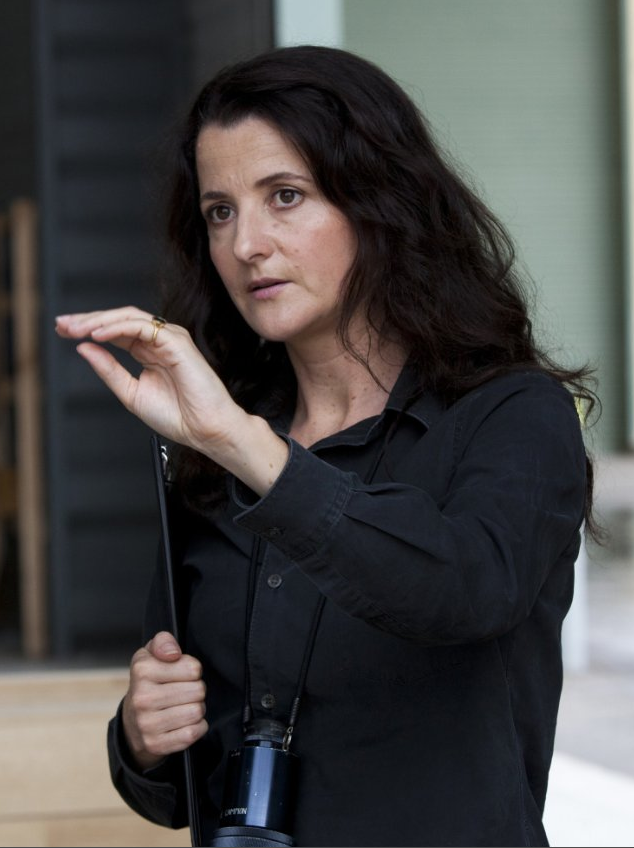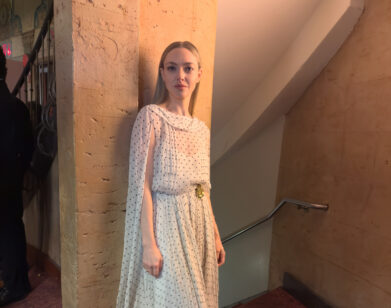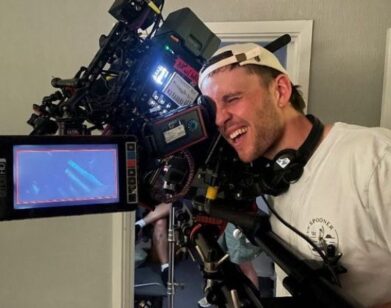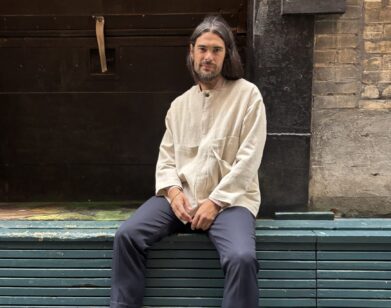While You Were Sleeping: Julia Leigh’s Dream World

ABOVE: JULIA LEIGH FILMING SLEEPING BEAUTY.
The quiet and haunting Sleeping Beauty, written and directed by Australian novelist Julia Leigh, isn’t simply a modern retelling of the classic story. In fact, it bears little resemblance. The film follows the descent of Lucy, played with gusto by the young actress Emily Browning, into the shadow world of high-class-low-kink sex work. When she agrees to participate in one of the most revered and hush-hush rituals—the “sleeping beauty” of the title, in which she is put to sleep for a number of hours so wealthy, Rodin-like old geezers can rest next to her still body—she suddenly becomes obsessed with what is going on during these lost hours.
The film is impeccably crafted from the beginning to end, with a steady, slow-moving camera that holds on scenes and keeps an unsettling distance. Interview spoke to Leigh about the film, the inspiration she found in a nightmare, and the comparable loneliness of a writer and director.
CRAIG HUBERT: I wanted to start by asking you about the rough idea for the film, which I read started with a dream.
JULIA LEIGH: Yeah, in part. After my first novel, The Hunter, was published, I did have a recurring nightmare that I was being filmed in my sleep, and that was an unfortunately compelling nightmare. I suppose I realized that we’re all quite vulnerable in our sleep. It’s almost as if we wake up and we edit out our nights and just stitch together our narrative of self for our waking days. So I began to wonder what it would be like to know something was happening to you in your sleep, and to know it probably wasn’t very good for you, and how that would make you feel and seep down into your waking life.
HUBERT: From the dream, where did the idea take you?
LEIGH: That was just sort of one vague thing. I’d read the fairy tale, of course, Sleeping Beauty—I’d read the Disney version, I’d read the original version by Charles Perrault, which is more brutal. I’d also read, and loved, two well-known novellas, one by Yasunari Kawabata, the other by Gabriel Garcia Marquez.
HUBERT: Which Marquez?
LEIGH: Memories of My Melancholy Whores. They’re both stories told from the point of view of older men who paid to sleep alongside a young girl. And I was aware of biblical story of King David sending out to spend the night alongside virgins; I was aware of sleeping girls on the Internet. So, I guess this concept of a sleeping beauty, it already existed, it was out there. I guess I responded to it and transformed it.
HUBERT: When in the process do you decide that this idea would be a film, as opposed to a novel?
LEIGH: Actually, with this project, I never asked myself the question: Should this be a book or a film? From the moment of first conception it was, to me, a cinematic project.
HUBERT: What appeals to you about the screenwriting process, as opposed to a novel or short story?
LEIGH: They’re just very different beasts, very hard to compare.
HUBERT: When you wrote Sleeping Beauty, did you always have in mind that you wanted to direct it as well?
LEIGH: When I wrote the film, I didn’t really see any further than finishing the script. So, in a way, the script was a stepping stone for me. You know, that said, as I wrote the script I envisioned the film, so things like the camera as this tender, steady witness—that was playing out in my mind’s eye.
HUBERT: I was wondering because writing, at times, can be such a solitary pursuit, while filmmaking seems inherently collaborative. Were you interested in collaborating with people?
LEIGH: Yeah. You know, in a funny way, the perceived loneliness of the writer is quite similar to the loneliness of the director, in that I was the only one who held the film as a whole in my head. But I very much enjoyed my collaborations. I was very lucky to work with great heads of department, and I suppose those relationships are effectively one on one, and we do that in our daily life all the time. It wasn’t as big a leap as people think; there were very few occasions where I would be addressing a big group, for example.
HUBERT: The world of the film is very interesting, and it reminded of the role the wilderness plays in your novel, The Hunter. It’s a world the main character enters in and out of, a mysterious world that has its own set of codes.
LEIGH: With this film, I was not interested in a strict naturalism—I feel it’s very far from the kitchen sink. I did want, especially when we go into the sleeping beauty world, an otherworldly feel, something heightened, in a way.
HUBERT: It’s very stylized.
LEIGH: Yeah. And 10,000 decisions go into achieving that, so it’s hard to pinpoint. For example, with the sound design, I wanted to have this feeling—you know the phrase, you could have heard a pin drop? To make your hearing quite acute.
HUBERT: I noticed, during the “sleeping beauty” sequences, you could very clearly hear her breathing.
LEIGH: Oh, you could! That’s great. They played it at the right level. [laughs] We worked extremely hard on that, and calibrated every breath.
HUBERT: What was the casting process like for the film?
LEIGH: This film involved nudity, so that did separate out the actors pretty quickly: some said no; some said yes, and then their management, more or less, said no; and some, like Emily, said yes. Lucy, the character, is in every scene in the film—she carries the film, it’s her story. In that way, it’s a strong role.
HUBERT: What was it about Emily Browning that made her right for the role?
LEIGH: Emily put down a test and I found that I couldn’t take my eyes off her. She has a strange beauty. I also thought she got the quiet and willful recklessness of the character.
HUBERT: I thought we could talk a little about the look of the film. How much did you think about things like the camera movements, and the distance it keeps from the characters?
LEIGH: An enormous amount of preparation. Because of the shooting style, those longer takes, did take a lot of preparation. We had to marry the performance to the camera to the overall pace, or flow, of the film. We did actually do quite a bit of work in the edit, it may seem like we didn’t. I guess because I was working with these longer takes I did have to, on the day, bear in mind the flow of the film. We weren’t building pace in the edit room.
HUBERT: The film deals with some heavy material. Do you think much about audience reaction?
LEIGH: It’s dangerous to think too much about how a film will be received. Filmmaking is not a popularity contest. Some would disagree. [laughs]
SLEEPING BEAUTY IS OUT IN THEATERS TOMORROW.






